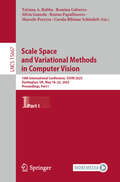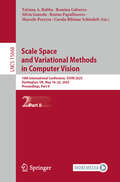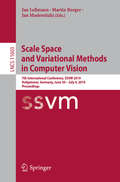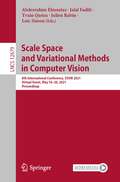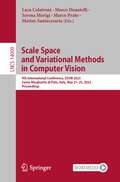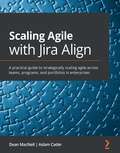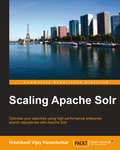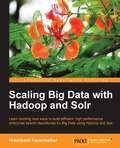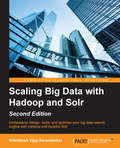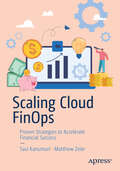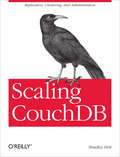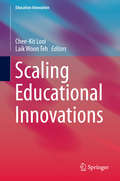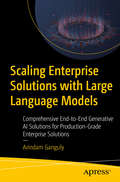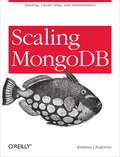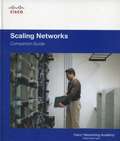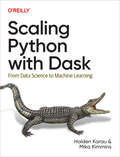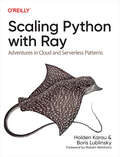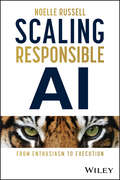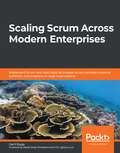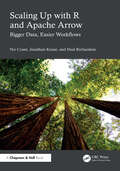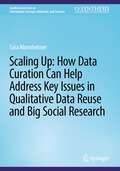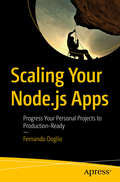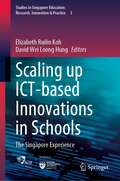- Table View
- List View
Scale Space and Variational Methods in Computer Vision: 10th International Conference, SSVM 2025, Dartington, UK, May 18–22, 2025, Proceedings, Part I (Lecture Notes in Computer Science #15667)
by Carola-Bibiane Schönlieb Tatiana A. Bubba Romina Gaburro Silvia Gazzola Kostas Papafitsoros Marcelo PereyraThe two-volume set LNCS 15667 and 15668 constitutes the proceedings of the 10th International Conference on Scale Space and Variational Methods in Computer Vision, SSVM 2025, which took place in Dartington, UK, in May 2025. The total of 63 full papers accepted in the proceedings were carefully reviewed and selected from 81 submissions. They were organized in topical sections as follows: Part I: Inverse Problems in Imaging; machine and deep learning in imaging; Part II: Optimization for imaging: theory and methods; scale space, PDES, flow, motion and registration.
Scale Space and Variational Methods in Computer Vision: 10th International Conference, SSVM 2025, Dartington, UK, May 18–22, 2025, Proceedings, Part II (Lecture Notes in Computer Science #15668)
by Carola-Bibiane Schönlieb Tatiana A. Bubba Romina Gaburro Silvia Gazzola Kostas Papafitsoros Marcelo PereyraThe two-volume set LNCS 15667 and 15668 constitutes the proceedings of the 10th International Conference on Scale Space and Variational Methods in Computer Vision, SSVM 2025, which took place in Dartington, UK, in May 2025. The total of 63 full papers accepted in the proceedings were carefully reviewed and selected from 81 submissions. They were organized in topical sections as follows: Part I: Inverse Problems in Imaging; machine and deep learning in imaging; Part II: Optimization for imaging: theory and methods; scale space, PDES, flow, motion and registration.
Scale Space and Variational Methods in Computer Vision: 7th International Conference, SSVM 2019, Hofgeismar, Germany, June 30 – July 4, 2019, Proceedings (Lecture Notes in Computer Science #11603)
by Martin Burger Jan Lellmann Jan ModersitzkiThis book constitutes the proceedings of the 7th International Conference on Scale Space and Variational Methods in Computer Vision, SSVM 2019, held in Hofgeismar, Germany, in June/July 2019. The 44 papers included in this volume were carefully reviewed and selected for inclusion in this book. They were organized in topical sections named: 3D vision and feature analysis; inpainting, interpolation and compression; inverse problems in imaging; optimization methods in imaging; PDEs and level-set methods; registration and reconstruction; scale-space methods; segmentation and labeling; and variational methods.
Scale Space and Variational Methods in Computer Vision: 8th International Conference, SSVM 2021, Virtual Event, May 16–20, 2021, Proceedings (Lecture Notes in Computer Science #12679)
by Jalal Fadili Abderrahim Elmoataz Yvain Quéau Julien Rabin Loïc SimonThis book constitutes the proceedings of the 8th International Conference on Scale Space and Variational Methods in Computer Vision, SSVM 2021, which took place during May 16-20, 2021. The conference was planned to take place in Cabourg, France, but changed to an online format due to the COVID-19 pandemic.The 45 papers included in this volume were carefully reviewed and selected from a total of 64 submissions. They were organized in topical sections named as follows: scale space and partial differential equations methods; flow, motion and registration; optimization theory and methods in imaging; machine learning in imaging; segmentation and labelling; restoration, reconstruction and interpolation; and inverse problems in imaging.
Scale Space and Variational Methods in Computer Vision: 9th International Conference, SSVM 2023, Santa Margherita di Pula, Italy, May 21–25, 2023, Proceedings (Lecture Notes in Computer Science #14009)
by Marco Donatelli Luca Calatroni Serena Morigi Marco Prato Matteo SantacesariaThis book constitutes the proceedings of the 9th International Conference on Scale Space and Variational Methods in Computer Vision, SSVM 2023, which took place in Santa Margherita di Pula, Italy, in May 2023. The 57 papers presented in this volume were carefully reviewed and selected from 72 submissions. They were organized in topical sections as follows: Inverse Problems in Imaging; Machine and Deep Learning in Imaging; Optimization for Imaging: Theory and Methods; Scale Space, PDEs, Flow, Motion and Registration.
Scaling Agile with Jira Align: A Practical Guide To Strategically Scaling Agile Across Teams, Programs, And Portfolios In Enterprises
by Dean MacNeil Aslam CaderThis book is for portfolio managers, program managers, product managers, product owners, executives, release train engineers, and scrum masters who want to empower their teams to deliver the right things at the right time and quickly respond to changes in the market. Familiarity with Jira Software is necessary; the book will teach you the rest.
Scaling Apache Solr
by Hrishikesh Vijay KarambelkarThis book is a step-by-step guide for readers who would like to learn how to build complete enterprise search solutions, with ample real-world examples and case studies. If you are a developer, designer, or architect who would like to build enterprise search solutions for your customers or organization, but have no prior knowledge of Apache Solr/Lucene technologies, this is the book for you.
Scaling Big Data with Hadoop and Solr
by Hrishikesh KarambelkarThis book is a step-by-step tutorial that will enable you to leverage the flexible search functionality of Apache Solr together with the Big Data power of Apache Hadoop.Scaling Big Data with Hadoop and Solr provides guidance to developers who wish to build high-speed enterprise search platforms using Hadoop and Solr. This book is primarily aimed at Java programmers who wish to extend the Hadoop platform to make it run as an enterprise search without any prior knowledge of Apache Hadoop and Solr.
Scaling Big Data with Hadoop and Solr - Second Edition
by Hrishikesh Vijay KarambelkarThis book is aimed at developers, designers, and architects who would like to build big data enterprise search solutions for their customers or organizations. No prior knowledge of Apache Hadoop and Apache Solr/Lucene technologies is required.
Scaling Cloud FinOps: Proven Strategies to Accelerate Financial Success
by Sasi Kanumuri Matthew ZeierResponding to the escalating demands placed on organizations and enterprises as they navigate the intricacies of cloud economics, this book offers pragmatic insights for establishing a sturdy foundation for cloud cost management. Scaling Cloud FinOps empowers you with the knowledge and strategies to harness efficient cloud technology usage to proficiently manage cloud costs, refine expenditure, and implement robust, scalable Cloud FinOps practices. At the same time, it arms engineering leaders and executives with the necessary tools to foster a culture of cost awareness critical to greater profitability. At the heart of the book lies author Sasi Kanumuri’s #Piggy-Bank Framework, an innovative approach to cloud cost governance that offers a practical blueprint to streamline cost reporting, provisioning, and resource management through automation, efficiency, and overall financial performance. You’ll also delve into the intricacies of the 6-factor formula, a proven approach to cloud cost management. From resource rightsizing and cost allocation models to automated guardrails and vendor management, each factor serves as a pillar to support your organization's financial goals. Looking beyond numbers, Scaling Cloud FinOps will give you the tools needed to orchestrate a cultural shift that can permeate every aspect of your organization. You'll learn how to cultivate a cost-aware engineering culture in which financial policies give every team member the knowledge and motivation to make data-driven decisions that drive efficiency, unlocking significant cost savings and cloud financial excellence. What You Will Learn Cultivate a culture of cost awareness and accountability within engineering teams, fostering collaboration and data-driven decision-making to enhance cloud efficiency Best practices from FinOps pioneers who've scaled world-class FinOps Teams at tech giants and startups Explore unique frameworks enriched with real-world case studies, providing invaluable insights into effective cloud cost management (CCM) Acquire expert techniques in cost optimization, automation, and vendor management, all proven to deliver significant savings and optimal efficacy Who This Book Is For Professionals and leaders across the cloud, IT, finance, and procurement industries interested in streamlining cloud expenditures, cultivating a culture of cost awareness across the organization, and establishing robust cloud cost management strategies. Whether you're a novice or seasoned in FinOps practices, this book equips you with the tools to maximize the business value of your cloud investments.
Scaling CouchDB: Replication, Clustering, and Administration
by Bradley HoltThis practical guide offers a short course on scaling CouchDB to meet the capacity needs of your distributed application. Through a series of scenario-based examples, this book lets you explore several methods for creating a system that can accommodate growth and meet expected demand. In the process, you learn about several tools that can help you with replication, load balancing, clustering, and load testing and monitoring.Apply performance tips for tuning your databaseReplicate data, using Futon and CouchDB’s RESTful interfaceDistribute CouchDB’s workload through load balancingLearn options for creating a cluster of CouchDB nodes, including BigCouch, Lounge, and PillowConduct distributed load testing with Tsung
Scaling Educational Innovations
by Chee-Kit Looi Laik Woon TehThis volume stimulates critical discussions of the different variants of implementation, translation and scaling research approaches. It presents an integrated collection of different implementation and scaling studies that analyse the different facets of co-design, learning design, curriculum development, technology development, professional development and programme implementation. It also provides critical reflections on their impact and efficacies on transforming practices, informing policy-making, and theory derivation and improvement. The chapters in this volume will provide readers a deeper understanding of scaling of educational innovations in diverse socio-cultural contexts.
Scaling Enterprise Solutions with Large Language Models: Comprehensive End-to-End Generative AI Solutions for Production-Grade Enterprise Solutions
by Arindam GangulyArtificial Intelligence (AI) is the bedrock of today's applications, propelling the field towards Artificial General Intelligence (AGI). Despite this advancement, integrating such breakthroughs into large-scale production-grade enterprise applications presents significant challenges. This book addresses these hurdles in the domain of large language models within enterprise solutions. By leveraging Big Data engineering and popular data cataloguing tools, you’ll see how to transform challenges into opportunities, emphasizing data reuse for multiple AI models across diverse domains. You’ll gain insights into large language model behavior by using tools such as LangChain and LLamaIndex to segment vast datasets intelligently. Practical considerations take precedence, guiding you on effective AI Governance and data security, especially in data-sensitive industries like banking. This enterprise-focused book takes a pragmatic approach, ensuring large language models align with broader enterprise goals. From data gathering to deployment, it emphasizes the use of low code AI workflow tools for efficiency. Addressing the challenges of handling large volumes of data, the book provides insights into constructing robust Big Data pipelines tailored for Generative AI applications. Scaling Enterprise Solutions with Large Language Models will lead you through the Generative AI application lifecycle and provide the practical knowledge to deploy efficient Generative AI solutions for your business. What You Will Learn Examine the various phases of an AI Enterprise Applications implementation. Turn from AI engineer or Data Science to an Intelligent Enterprise Architect. Explore the seamless integration of AI in Big Data Pipelines. Manage pivotal elements surrounding model development, ensuring a comprehensive understanding of the complete application lifecycle. Plan and implement end-to-end large-scale enterprise AI applications with confidence. Who This Book Is For Enterprise Architects, Technical Architects, Project Managers and Senior Developers.
Scaling Machine Learning with Spark: Distributed ML with MLlib, TensorFlow, and PyTorch
by Adi PolakLearn how to build end-to-end scalable machine learning solutions with Apache Spark. With this practical guide, author Adi Polak introduces data and ML practitioners to creative solutions that supersede today's traditional methods. You'll learn a more holistic approach that takes you beyond specific requirements and organizational goals--allowing data and ML practitioners to collaborate and understand each other better. Scaling Machine Learning with Spark examines several technologies for building end-to-end distributed ML workflows based on the Apache Spark ecosystem with Spark MLlib, MLflow, TensorFlow, and PyTorch. If you're a data scientist who works with machine learning, this book shows you when and why to use each technology. You will: Explore machine learning, including distributed computing concepts and terminologyManage the ML lifecycle with MLflowIngest data and perform basic preprocessing with SparkExplore feature engineering, and use Spark to extract featuresTrain a model with MLlib and build a pipeline to reproduce itBuild a data system to combine the power of Spark with deep learningGet a step-by-step example of working with distributed TensorFlowUse PyTorch to scale machine learning and its internal architecture
Scaling MongoDB: Sharding, Cluster Setup, and Administration
by Kristina ChodorowCreate a MongoDB cluster that will grow to meet the needs of your application. With this short and concise book, you'll get guidelines for setting up and using clusters to store a large volume of data, and learn how to access the data efficiently. In the process, you'll understand how to make your application work with a distributed database system.Scaling MongoDB will help you:Set up a MongoDB cluster through shardingWork with a cluster to query and update dataOperate, monitor, and backup your clusterPlan your application to deal with outagesBy following the advice in this book, you'll be well on your way to building and running an efficient, predictable distributed system using MongoDB.
Scaling Networks Companion Guide
by Cisco Networking Academy Program StaffScaling Networks Companion Guide is the official supplemental textbook for the Scaling Networks course in the Cisco® CCNA® Academy® This course describes the architecture, components, and operations of routers and switches in a large and complex network. You will learn how to configure routers and switches for advanced functionality. By the end of this course, you will be able to configure and troubleshoot routers and switches and resolve common issues with OSPF, EIGRP, STP, and VTP in both IPv4 and IPv6 networks. You will also develop the knowledge and skills needed to implement DHCP and DNS operations in a network. The Companion Guide is designed as a portable desk reference to use anytime, anywhere to reinforce the material from the course and organize your time. The book's features help you focus on important concepts to succeed in this course.
Scaling Python with Dask: From Data Science to Machine Learning
by Holden Karau Mika KimminsModern systems contain multi-core CPUs and GPUs that have the potential for parallel computing. But many scientific Python tools were not designed to leverage this parallelism. With this short but thorough resource, data scientists and Python programmers will learn how the Dask open source library for parallel computing provides APIs that make it easy to parallelize PyData libraries including NumPy, pandas, and scikit-learn.Authors Holden Karau and Mika Kimmins show you how to use Dask computations in local systems and then scale to the cloud for heavier workloads. This practical book explains why Dask is popular among industry experts and academics and is used by organizations that include Walmart, Capital One, Harvard Medical School, and NASA.With this book, you'll learn:What Dask is, where you can use it, and how it compares with other toolsHow to use Dask for batch data parallel processingKey distributed system concepts for working with DaskMethods for using Dask with higher-level APIs and building blocksHow to work with integrated libraries such as scikit-learn, pandas, and PyTorchHow to use Dask with GPUs
Scaling Python with Ray: Adventures in Cloud and Serverless Patterns
by Holden Karau Boris LublinskyServerless computing enables developers to concentrate solely on their applications rather than worry about where they've been deployed. With the Ray general-purpose serverless implementation in Python, programmers and data scientists can hide servers, implement stateful applications, support direct communication between tasks, and access hardware accelerators.In this book, experienced software architecture practitioners Holden Karau and Boris Lublinsky show you how to scale existing Python applications and pipelines, allowing you to stay in the Python ecosystem while reducing single points of failure and manual scheduling. Scaling Python with Ray is ideal for software architects and developers eager to explore successful case studies and learn more about decision and measurement effectiveness.If your data processing or server application has grown beyond what a single computer can handle, this book is for you. You'll explore distributed processing (the pure Python implementation of serverless) and learn how to:Implement stateful applications with Ray actorsBuild workflow management in RayUse Ray as a unified system for batch and stream processingApply advanced data processing with RayBuild microservices with RayImplement reliable Ray applications
Scaling Responsible AI: From Enthusiasm to Execution
by Noelle RussellImplement AI in your organization with confidence while mitigating risk with responsible, ethical guardrails Much like a baby tiger in the wild, artificial intelligence is almost irresistibly alluring. But, just as those tiger cubs inevitably grow up into formidable and fierce adults, the dangers and risks of AI make it a force unto itself. Useful and profitable, yes, but also inherently powerful and risky. In Scaling Responsible AI: From Enthusiasm to Execution, celebrated speaker, AI strategist, and tech visionary Noelle Russell delivers an exciting and fascinating new discussion of how to implement artificial intelligence responsibly, ethically, and profitably at your organization. Responsible AI promises immense opportunity, but unguided enthusiasm can unleash serious risks. Learn how to implement AI ethically and profitably at your company with Scaling Responsible AI. In this groundbreaking book, Noelle Russell reveals an executable framework to: Harness AI's full potential while safeguarding your firm's reputation Mitigate bias, accuracy, privacy, and cybersecurity risks from the start Make informed choices by seeing through the hype and identifying true AI value Develop an ethical AI culture across teams and leadership Scaling Responsible AI equips executives, managers, and board members with the knowledge and responsibility to make smart AI decisions. Avoid compliance disasters, brand damage, or wasted resources on AI that fails to deliver. Implement artificial intelligence that drives profits, innovation, and competitive edge—the responsible way.
Scaling Scrum Across Modern Enterprises: Implement Scrum and Lean-Agile techniques across complex products, portfolios, and programs in large organizations
by Cecil Rupp Manjit SinghEstablish business agility in your organization by applying industry-proven scaling strategies from popular Scrum frameworks such as Scrum of Scrums (SoS), Scrum@Scale, Nexus, Large-Scale Scrum (LeSS), Disciplined Agile, and SAFe Key Features Learn how to be Agile at scale by implementing best practices Understand how Lean-Agile practices are incorporated in Disciplined Agile and the Scaled Agile Framework (SAFe) Customize Scrum and Lean-Agile practices to support portfolio and large product development needs Book Description Scaled Scrum and Lean-Agile practices provide essential strategies to address large and complex product development challenges not addressed in traditional Scrum. This Scrum/ Lean-Agile handbook provides a comprehensive review and analysis of industry-proven scaling strategies that enable business agility on an enterprise scale. Free of marketing hype or vendor bias, this book helps you decide which practices best fit your situation. You'll start with an introduction to Scrum as a lightweight software development framework and then explore common approaches to scaling it for more complex development scenarios. The book will then guide you through systems theory, lean development, and the application of holistic thinking to more complex software and system development activities. Throughout, you'll learn how to support multiple teams working in collaboration to develop large and complex products and explore how to manage cross-team integration, dependency, and synchronization issues. Later, you'll learn how to improve enterprise operational efficiency across value creation and value delivery activities, before discovering how to align product portfolio investments with corporate strategies. By the end of this Scrum book, you and your product teams will be able to get the most value out of Agile at scale, even in complex cyber-physical system development environments. What you will learn Understand the limitations of traditional Scrum practices Explore the roles and responsibilities in a scaled Scrum and Lean-Agile development environment Tailor your Scrum approach to support portfolio and large product development needs Apply systems thinking to evaluate the impacts of changes in the interdependent parts of a larger development and delivery system Scale Scrum practices at both the program and portfolio levels of management Understand how DevOps, test automation, and CI/CD capabilities help in scaling Scrum practices Who this book is for Executives, product owners, Scrum masters, development team members, and other stakeholders who need to learn how to scale Agile to support large, complex projects and large enterprise portfolios and programs will find this book useful. A basic understanding of the values and principles of Agile and the Scrum-based framework for Agile development practices is required before you get started with this Agile Scrum book.
Scaling Up Machine Learning
by John Langford Ron Bekkerman Mikhail BilenkoThis book presents an integrated collection of representative approaches for scaling up machine learning and data mining methods on parallel and distributed computing platforms. Demand for parallelizing learning algorithms is highly task-specific: in some settings it is driven by the enormous dataset sizes, in others by model complexity or by real-time performance requirements. Making task-appropriate algorithm and platform choices for large-scale machine learning requires understanding the benefits, trade-offs, and constraints of the available options. Solutions presented in the book cover a range of parallelization platforms from FPGAs and GPUs to multi-core systems and commodity clusters, concurrent programming frameworks including CUDA, MPI, MapReduce, and DryadLINQ, and learning settings (supervised, unsupervised, semi-supervised, and online learning). Extensive coverage of parallelization of boosted trees, SVMs, spectral clustering, belief propagation and other popular learning algorithms and deep dives into several applications make the book equally useful for researchers, students, and practitioners.
Scaling Up with R and Apache Arrow: Bigger Data, Easier Workflows
by Nic Crane Jonathan Keane Neal RichardsonAnalyze large datasets directly from R. Scaling Up With R and Arrow provides a guide to working efficiently with larger-than-memory datasets using the arrow R package. As data grows in size and complexity, traditional data analysis methods in R often hit technical limitations. In this book, you'll learn how to overcome these hurdles without needing to set up complex infrastructure.You'll learn about the Apache Arrow project's origins, goals, and its significance in bridging the gap between data science and big data ecosystems. You'll also learn how to leverage the arrow R package to work directly with files in various formats, such as CSV and Parquet, using familiar dplyr syntax. This book explores practical topics like data manipulation, file formats, working with larger datasets, and optimizing workflows for data in cloud storage. Advanced chapters examine user-defined functions, integration with other tools like DuckDB, and extending Arrow's capabilities to work with geospatial data.Written by developers of the Arrow R package, this guide is essential for anyone looking to scale their data processing capabilities in R.
Scaling Up: How Data Curation Can Help Address Key Issues in Qualitative Data Reuse and Big Social Research (Synthesis Lectures on Information Concepts, Retrieval, and Services)
by Sara MannheimerThis book explores the connections between qualitative data reuse, big social research, and data curation. A review of existing literature identifies the key issues of context, data quality and trustworthiness, data comparability, informed consent, privacy and confidentiality, and intellectual property and data ownership. Through interviews of qualitative researchers, big social researchers, and data curators, the author further examines each key issue and produces new insights about how domain differences affect each community of practice’s viewpoints, different strategies that researchers and curators use to ensure responsible practice, and different perspectives on data curation. The book suggests that encouraging connections between qualitative researchers, big social researchers, and data curators can support responsible scaling up of social research, thus enhancing discoveries in social and behavioral science.
Scaling Your Node.js Apps: Progress Your Personal Projects to Production-Ready
by Fernando DoglioTake your Node.js application into production-ready status, capable of scaling up to whatever your needs might be. You'll discover that architecting for successful, popular sites is an essential tool of any professional Node.js developer, and learning to scale your own applications is a great place to start. Using this book you will learn when to scale, what factors should trigger scaling, and what architectural techniques are best suited for scaling. You will also explore common pitfalls that arise when scaling a Node.js application and solutions to correct them.Including analyses of success cases at the largest-scale companies, such as Netflix and Paypal, this book will get you started with scaling in no time at all. What You'll LearnDetermine what factors should trigger the need to scaleDiscover different architectural patterns that lend themselves to scalingResolve problems that arise when scaling up a Node.js applicationMonitor a platform in order to understand when to start scalingWho This Book Is ForThe main audience for this book are Node.js developers with a mid-level understanding of the technology. Novice Node users will also benefit from the coverage of generic scaling-related topics.
Scaling up ICT-based Innovations in Schools: The Singapore Experience (Studies in Singapore Education: Research, Innovation & Practice #3)
by Elizabeth Ruilin Koh David Wei Loong HungThis collected book is about the eduLab projects, an initiative with focus on Scaling Change through Apprenticising and Ecological Leadership, designed to surface and spread ground-up information and communication technology-based pedagogical innovations. It presents the goals and rationale behind eduLab, an overview of the research projects conducted by its principal investigators during its funding tenure, as well as synthesizing thoughts on the entire endeavor. This book not only marks the achievements of the eduLab programme but also serves as inspiration for future projects. It presents Singapore education in action – a continually evolving and adapting education system that delivers a system well known for its high quality as much as it is forward-looking.
